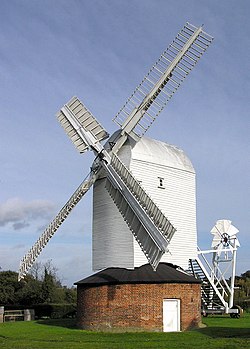History
Upthorpe Mill was built in 1751. It was originally built as an open trestle post mill. In 1818 it was moved to its present site. At some point in time the Common sails were replaced by Double Patent sails, a roundhouse later being added and a fantail fitted to turn the mill into wind automatically. [2] The mill ended its commercial working life on a single pair of sails. It was disused by 1918 and in 1937 was becoming derelict. Rex Wailes inspected the mill on behalf of the Society for the Protection of Ancient Buildings and an appeal for funds to restore the mill was launched in 1938. In 1939, millwright Amos Clarke, along with Messrs Hunts of Soham commenced repairs which cost £600. A new side girt was fitted to the left side of the mill and the roundhouse roof was repaired. The tailstones were removed at this time. The intention was to fit the cast iron windshaft from Great Mill, Wickhambrook in place of the existing wooden windshaft and to add a new pair of sails but this work was not done owing to the outbreak of the Second World War. The mill was painted grey to reduce its conspicuousness as a landmark, as it was close to RAF Shepherds Grove. The mill was worked during the war, but ceased to be used in 1946 as it was unprofitable. By the late 1960s, the mill was again becoming derelict, and the fantail was carefully dismantled by Chris Hullcoop and Philip Lennard. [3] In 1979, emergency repairs were carried out by Suffolk Mills Group and in 1986 the mill was bought by Richard Duke. Restoration work was carried out and the mill was able to grind again in 1990. In 1993, the mill was bought by Peter Dolman and further restoration work was carried out. [4]
This page is based on this
Wikipedia article Text is available under the
CC BY-SA 4.0 license; additional terms may apply.
Images, videos and audio are available under their respective licenses.

